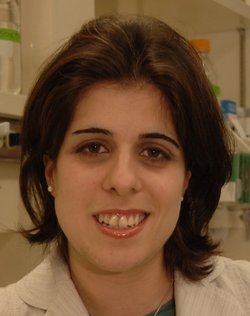Agnel Sfeir
2010 Regional Award Finalist — Post-Doc

Current Position:
Assistant Professor, Department of Cell Biology
Institution:
New York University (Previously at The Rockefeller University)
Discipline:
Molecular & Cellular Biology
Areas of Research Interest and Expertise: Chromosome biology; Stem cell biology; Telomere length regulation; DNA damage signaling and repair
Biography:
PhD, The University of Texas Southwestern Medical Center
The linearity of chromosomes creates two major problems for eukaryotic cells: the end replication problem and the end protection problem. The former stems from the inherent inability of the replication machinery to fully duplicate linear templates. The latter refers to the propensity of linear chromosome ends to be recognized as DNA double stranded breaks. To surmount both problems, cells use telomeres, the specific nucleoprotein complexes that are essential to ensure genomic stability and promote cellular survival.
In mammalian cells, telomeres consist of long tracts of repetitive DNA sequences (TTAGGG) that are bound by a specialized six-subunit protein complex termed shelterin. Telomeres are replenished by telomerase, a reverse transcriptase that is active in the germ line and during early embryonic development. Normal human somatic cells lack the activity of telomerase and gradually loose telomeric repeats during progressive division cycles until they ultimately undergo cellular senescence.
Agnel Sfeir is mainly interested in understanding the basic mechanism that leads to telomere length resetting. In particular, Dr. Sfeir and her colleagues rely on nuclear reprograming as a platform to identify factors that regulate telomere length. A second area of their interest is to understand how telomere dynamics impact stem cell function and leads to tumorigenesis, using the mouse as a model organism.
Key Publications:
- Mateos-Gomez, Pedro A; Gong, Fade; Nair, Nidhi; Miller, Kyle M; Lazzerini-Denchi, Eros ; Sfeir, Agnel. Mammalian polymerase theta promotes alternative-NHEJ and suppresses recombination. Nature. 2015
- Yeung, Frank; Ramirez, Cristina; Mateos-Gomez, Pedro;Pinzaru, Alexandra; Ceccarini, Giovanni;Kabir, Shaheen; Fernández-Hernando, Carlos; Sfeir, Agnel. Non-telomeric role for Rap1 in regulating metabolism and protecting against obesity. Cell Reports. 2013
- Sfeir, Agnel. Telomeres at a glance. Journal of Cell Science. 2012
In the Media:
Three NYU faculty receive awards from Pew Charitable Trusts. Phys.org. June 24th, 2014
SFEIR LAB
